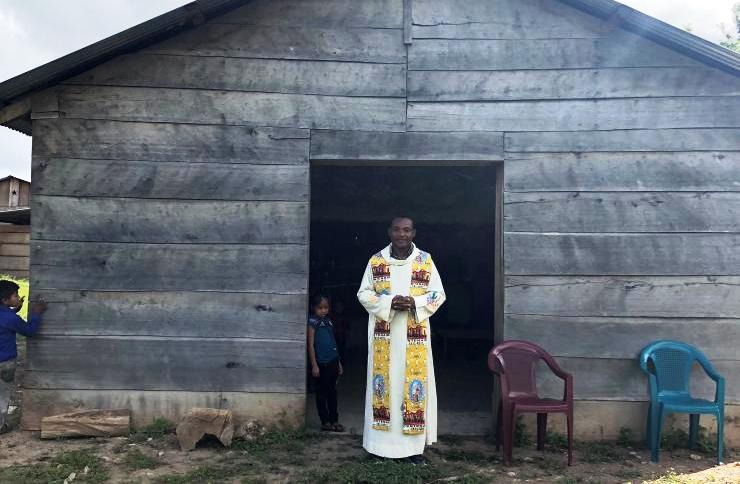Father Fabrice Agbetiafa from Togo shares with us his experience with Q’eqcht, the indigenous people in the Petel region of northern Guatemala.
After completing my theological studies in Lima, Peru in 2014, I returned to my home country of Togo, West Africa. Within the same year I was ordained as a priest in the capital city of Lome with 19 others and then sent to Guatemala for my first mission assignment.
Guatemala was a completely new context for me, even though I had been in Peru for five years. With humility, enthusiasm, joy, and without forgetting my personal limitations and the fact of being a young missionary, I set out to live the Mission in these distant lands with passion and counting on the grace of God. In the beginning, I worked in vocation promotion until October 2019, when I was sent to the parish of San Luis, where I am now.
This Comboni mission is located in the Department of Peten, in northern Guatemala, 363 kilometers from the capital. The community opened after a discernment in which a presence was sought among the most impoverished in Central America. San Luis, located in a mostly Q’eqchi area, is the largest of the 18 parishes of the Apostolic Vicariate of Peten.
In order to work better and promote the inculturation of the Gospel in the community, we commit ourselves to learn their language and to getting to know the customs of the people we accompany and serve. That is why I began to study the language, culture, and Q’eqchies customs in Coban, although now, due to the coronavirus, I have had to pause that learning, as well as reduce my activities with the Catholic communities.
In the parish of San Luis there are four Comboni priests, who attend its 15 centres. Each one of the centres has a certain number of people. Although it is not the same in all, as they are divided along a geographical and linguistic criterion.
Although most of them are Q’eqchies, there are also communities where the faithful only speak Spanish. In total, there are about 120 Christian communities, of which I know about 100. All this time I have essentially devoted myself to visiting and getting to know them, celebrating baptisms, weddings, Eucharist, visiting the sick, participating in the patron saint festivities, confessions… Several times I have celebrated the Eucharist in a Christian community and slept there. Then I go out the next day and celebrate another.
I participate regularly in the meetings of the coordinators of the communities, who are usually catechists and those responsible for the sectors. To reach them, there are times when we have to travel three hours by car, although it is also common that we have to leave the vehicle parked to cross a river or walk through the forest accompanied by the noise of howler monkeys.
In the few months that I have been in Peten, I have had to walk a lot in the middle of the mud and eaten by mosquitoes. Although I cannot swim, I have crossed rivers in small canoes that can easily capsize at the slightest movement or imbalance.
These are despite everything, precious and uplifting missionary experiences that fill life. The beauty of all this is when you arrive, and the community awaits you with a fraternal welcome and breakfast. After mass or the meeting, they say goodbye to us with a shared lunch, which truly characterizes the Q’eqchi people.
The parish is very lively and requires great commitment. I am very happy here. We have a solvent structure and many committed lay people willing to train and better serve the community. The experience of my first mission continues to be written. I have much to know, live and discover.






